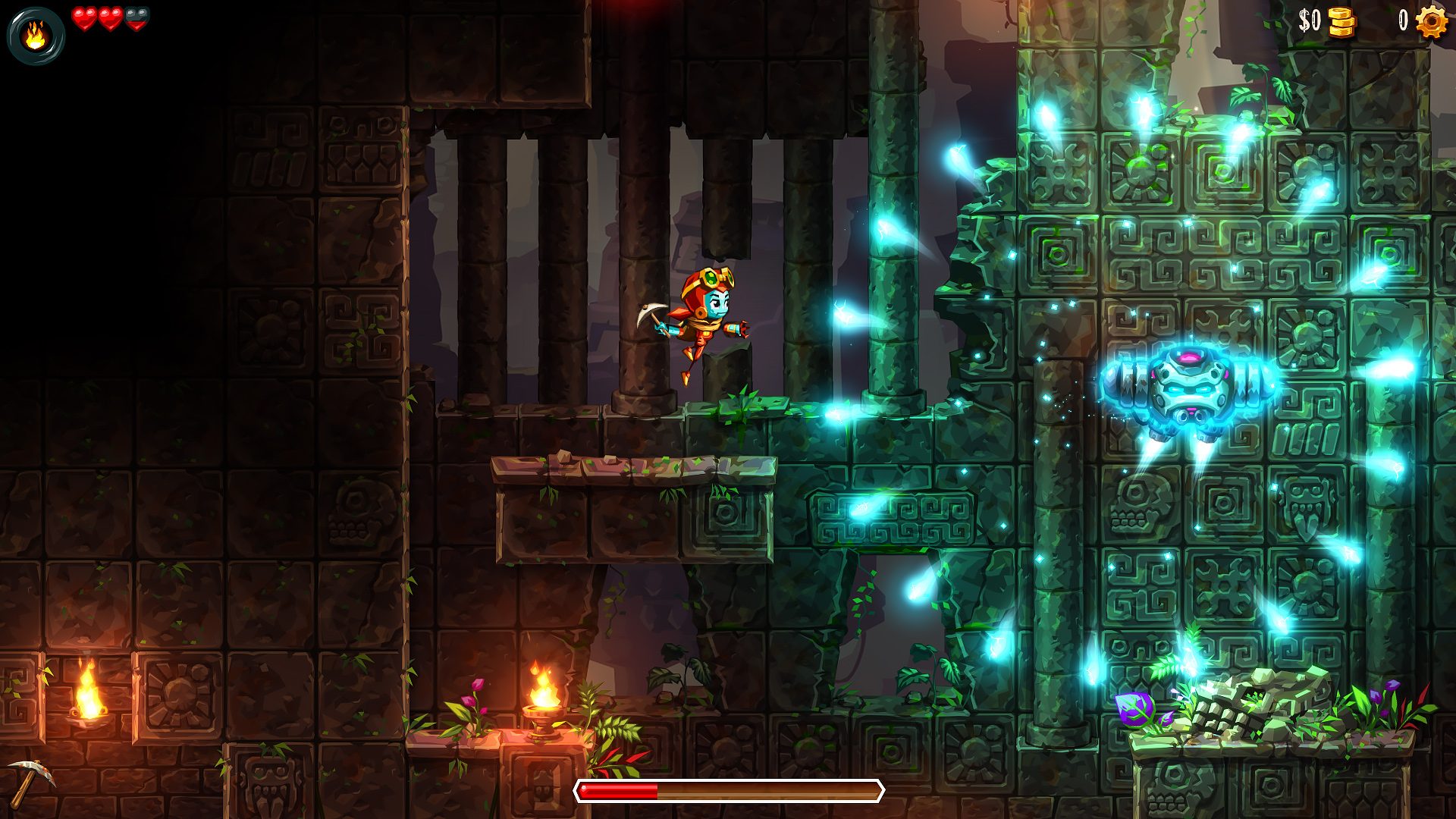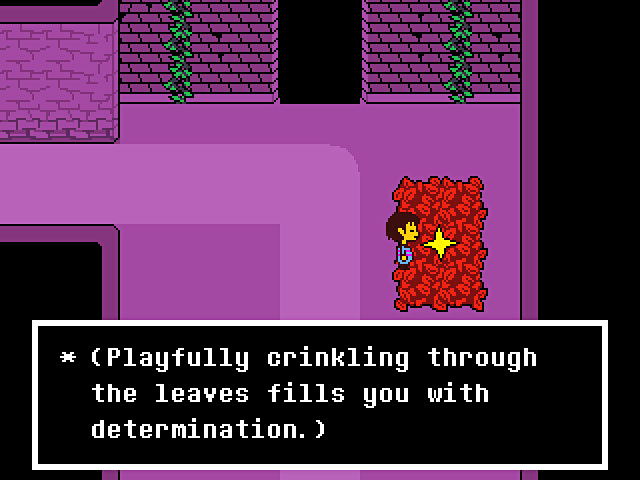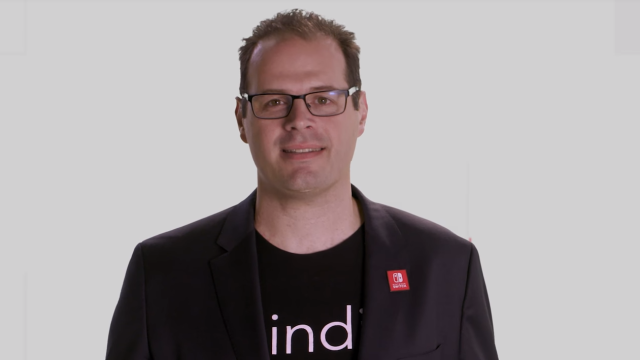Once the red-headed stepchild of the Nintendo family, indie games have now established themselves as one of the main reasons to pick up a Switch. At the forefront of Nintendo’s efforts to shore up indie support on its platforms is Damon Baker, Nintendo’s senior manager of publisher and developer relations.
Nintendo’s Damon Baker.Photo: Nintendo (YouTube)
Next to Nintendo of America president Reggie Fils-Aime, Baker has become one of the most recognised faces of the company’s US branch, since he’s often seen hosting indie-focused events like Nindies @ Night or this week’s Nindies livestream. I tracked down Baker at Nintendo’s Game Developers Conference event on Tuesday to talk about the current state of indies on Switch.
He told me about the various efforts Nintendo is taking to make it easier for developers to publish on the platform, from putting more power in the hands of “trusted partners” to make decisions about what sort of content to put on Switch, to simplifying the process by which developers submit a game to Nintendo, to fixing up the eShop. We even touched on whether indie developers, in the future, might be able to use Labo. (Answer: maybe!)
Nintendo’s New Audience: ‘Core’ Gamers
Kotaku: Switch has been out for a year now. Has Nintendo’s thought process about what kinds of games it wants on the platform changed?
Damon Baker: Not exactly. It’s still about quality, first and foremost. But I think we have a better understanding of what is resonating on the system. I think we know that we can tap into — a Nintendo Switch fan is gravitating towards a sense of nostalgia. They’re really digging the types of games and experiences that are heavily inspired by the games that they grew up with.
Or certain types of genres, like the platformers or Metroidvanias or any of those styles. Or it’s also, you know, kind of a nostalgic slant on the graphics — pixelated or retro-styled graphics.
Kotaku: You mentioned that nostalgia is a commonality between all these best-selling games. Have you thought about why that might be the case, on the Switch versus other platforms?
Baker: I think it comes with the territory of being a Nintendo fan. A lot of our fans on the platform, they grew up playing Nintendo consoles as well. They grew up playing these platformers, and these recognisable characters from Nintendo lore. I think there’s a sense of nostalgia, and what I also mentioned this morning was that we also have this newer audience on board, which is this core and active gamer demographic.
And I hate using marketing speak and everything, but the fact is, we’ve always been known as being kids- and family-friendly, and we’ve had these two peaks, but now we’ve been able to fill that gap.

Steamworld Dig 2 is one of the best-selling indie games on Switch.
It also means with that, there’s certain types of content and certain genres and things that resonate with the core audience. And even on the third-party side, it’s why things like Skyrim, and Doom and our relationships with Bethesda, Rockstar and 2K and all these great publishers that are on board and supporting this content, have been able to find a home and a voice there.
On the indie side, it’s even more pronounced. The fact that we’re able to release M-rated content, horror games, and the wide gamut of content that’s actually doing quite well. I think the nostalgia is also, you know, people want to play some of their favourite games in new ways. And there’s a lot of people who are double-dipping on content that they own on another platform, especially the PC crowd.
The fact that they can then play that game in a portable fashion is really resonating with fans as well.
Opening The Door For Indies
Kotaku: When the Switch launched, I think that if you were an indie developer and Nintendo returned your emails and you got a dev kit and you got your game on Switch, you were really happy with the whole process. If you were on the other side of that and Nintendo was, like, well, this isn’t what we’re looking for right now or we can’t give you a dev kit right now, you were pretty bummed about the whole process.
There still seem to be some developers who say ‘our game can’t get on Switch.’ What’s the situation with that now?
Baker: I think the best way to explain it is, over the last year we have been evolving past what was initially more of a curated content position to now a curated partnership position. So part of the pitch process for new developers or new publishers who come on board with Switch is to not just pitch us a brand new game or a brand new concept, but to use that opportunity to prove their background, their aptitude as a developer and whether they’re going to be able to navigate through what can be a complicated process of going through the development cycle, certification and all of that. So that’s part of our evaluation.
I can’t really disclose all of our guidelines, but I can tell you that those partners that are able to instil a level of trust and confidence in us that they’re going to be very capable of getting through the development process and are knowledgeable about bringing content out on consoles, those are the ones that are resonating in terms of bringing that content out and it doing well on the system.
Some of those developers do have a negative reaction or are bummed because we haven’t opened up the door to hobbyists or students at this time. But one day, we may. We may be going towards that direction. But for now, we’re still staying the course in terms of a closed dev environment for Switch.
Kotaku: Would you say that if you were thinking of self-publishing that maybe it makes sense to go talk to a publisher?
Baker: It can help. We definitely encourage self-publishing, there’s no doubt about that, but I will say, yeah, we are putting a lot of that trust in those trusted partnerships, for them to make the call on what content is appropriate to bring to Switch. So when we’re working with the likes of Team 17, or Chucklefish, or Raw Fury, or Devolver, or Adult Swim or anybody like that, we lean on them for their recommendations.
They’re the ones coming to us to say, hey, look, we’ve picked up this developer, we’ve picked up this team that we think would be a perfect fit on Switch, but they’re not registered yet, can you help them out? And that’s when we kind of grandfather them into the process, based on that level of confidence from one of our trusted partners.
Kotaku: So you guys would rather not be looking at every game saying, this but not that, this but not that.
Baker: Yeah. We don’t have any intention of playing God. What I like might not be what everybody likes. Luckily, the stuff that we’ve brought through so far has resonated really strongly, it’s got a high level of quality and response from the community. But we really want to rely on the trusted sources to make those calls. So that is our preference, is to not have to look at every single piece of content. Although right now we are reviewing everything.
Region-Free Gaming: It’s Great For Devs, Too
Kotaku: What’s interesting is that Switch is region-free. So if you have a game published in Japan, anybody around the world could potentially buy that.
Baker: Absolutely.
Kotaku: How does that change the consideration?
Baker: Well, one, it makes things simpler for those developers that are on board. Having a global certification process, global ROM submission, is way easier than submitting three different ROMs to accommodate all the different regions.
So I think we’ve put a lot of time and effort, in the last couple of years actually, in revamping our processes so that with Nintendo Switch we could have a really easy and intuitive process for developers to bring their content over as painlessly as possible.
Kotaku: And that’s new, right? On Wii U, there was no global ROM.
Baker: No. It was region-specific. And even some other platforms right now are still region-specific. So I think we’ve made a lot of strides there to improve that process. Same in terms of technical support and having this Nintendo developer portal that’s opened, a centralised location where people can ask questions and reach the support teams, but also share knowledge through forums and easily order dev kits.
We made the dev kits more affordable, we made middleware support more readily available, so we try to implement all these things to make the process as easy as possible for our partners once they get through that original pitch. It’s not like we’re resting on our laurels either. There’s lots more improvements to be made there, but so far so good.

Indie hit Undertale, inspired in part by Nintendo’s own EarthBound games, is finally on its way to Switch this year.
Fixing Up The eShop
Kotaku: On the one hand, it can be difficult to get one’s game on Switch, but from the player’s perspective there’s this avalanche of content. What do you feel the limitations of eShop are, and how might you address them in the future?
Baker: I mean, full transparency, the eShop was always intended to be a transactional destination, versus a merchandising destination. From the very beginning. But as we’ve populated it with more and more content, I mean, it’s our responsibility to acknowledge that and help find ways to improve visibility and discoverability both on device and off-device. So I think the fact that the company is listening to that, that there are steps being taken — and that’s been in motion already.
In the eShop, on top of the news channel improvements there, being able to add areas like Games On Sale and Best-Sellers List, these other ways of categorising titles that our partners can take advantage of. But there will be continued improvements on that as well, to make sure that we can ensure that our consumers and our fans can actually find the content that is relevant to them.
Labo?
Kotaku: With Labo, Nintendo is about to redefine what the Switch is, and what you use it for. Right now, Labo is two first-party games. Is it a platform that other developers might be able to make stuff with at some point?
Baker: It could be. I mean, I think it’s similar to Amiibo. If it resonates with a bigger community, and there’s a bigger installed base, and it ends up working really really well, then we’ll definitely have those conversations from a third-party perspective of, what makes sense, and if there’s a way to tap into that excitement as well. So, anything’s possible.

Comments
4 responses to “Switch’s Success Means A Changing Nintendo”
The wii u eshop was easily the best of any I’ve ever tried in terms of ergonomics and discoverability. The switch is quite possibly the worst.
Whhhyyy?!
Fully agree. The WiiU eShop is great. Easy to navigate, colourful, musical.
The Switch shop is just… there.
From the article it sounds like the eShop was meant to be “transactional”, so I guess it being just “there” makes sense. I think they were figuring you were going to be discovering games elsewhere and were just going to the store with purchases in mind, rather than going to the store and browsing. That way the store is snappy and simple, rather than long load times and tons of stuff in your face you might not necessarily be wanting.
Which is so wrong honestly lol, I love browsing through digital stores for hours. But you know, maybe they’ll change it?
Because they must pretend the Wii U never happened at all costs.